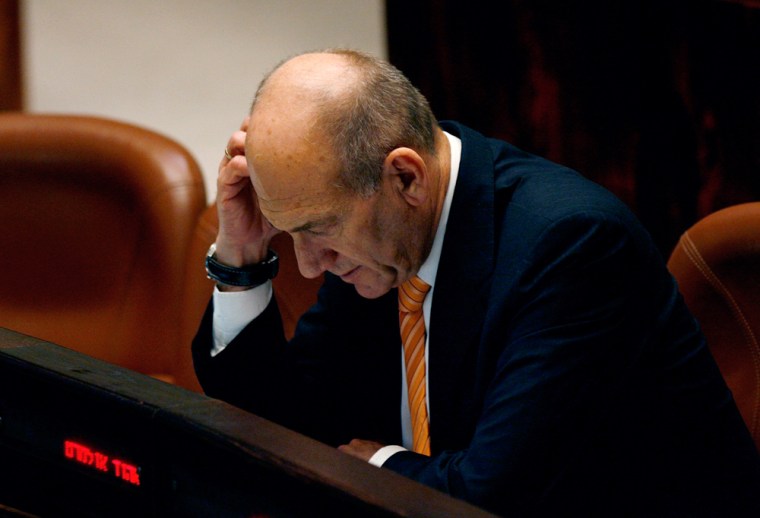Israeli and Palestinian leaders Wednesday called off a planned summit this week, dealing a new setback to efforts to halt fighting between the Israeli army and militants in the Gaza Strip and restart peacemaking.
The Palestinian foreign minister, meanwhile, said the so-called Quartet of Mideast negotiators had invited Palestinian President Mahmoud Abbas and Israeli Prime Minister Ehud Olmert to a meeting in Egypt on June 25. An official in Olmert’s office, David Baker, said no invitation had been received.
In an article Wednesday, Olmert said Israel was ready to discuss an Arab peace proposal, but his Palestinian counterpart called the climate between the two sides “catastrophic.” Their comments, in dueling opinion pieces in the British newspaper The Guardian, came as the two sides reflect on the 1967 Mideast war, which began 40 years ago Tuesday.
Olmert and Abbas had been expected to meet Thursday in the West Bank town of Jericho, in what would have been their first talks on Palestinian territory. Baker said the meeting was postponed at the request of the Palestinians.
“Prime Minister Olmert will be ready to meet with Abu Mazen at any time,” Baker said, using Abbas’ nickname.
Tax revenue demands rejected
Palestinian officials said Israel has rejected demands to release hundreds of millions of dollars in frozen Palestinian tax revenues, restart peace talks or accept Abbas’ proposal for restoring a collapsed cease-fire in the Gaza Strip and extending it to the West Bank.
“Israel is not responding positively to these demands, so the president decided not to go to this meeting,” Palestinian Foreign Minister Ziad Abu Amr said. He later said Olmert and Abbas were invited to Cairo by the Quartet — the U.S., European Union, U.N. and Russia.
Abu Amr said the meeting was important because it signaled stepped up international involvement. “If the Quartet meeting does not come with concrete results, it is going to undermine the credibility of the Quartet,” he said.
Under prodding from Secretary of State Condoleezza Rice, Olmert and Abbas agreed in March to meet every two weeks with the aim of discussing the outlines of a permanent peace deal.
However, they have met only once since then, and any chances of reviving peace talks have been clouded by the resumption of fighting in Gaza.
A five-month truce collapsed last month when Hamas militants began firing barrages of crude rockets into southern Israel. The Israeli army has responded with dozens of airstrikes and several brief ground incursions. More than 60 Palestinians, most of them militants, and two Israeli civilians have been killed.
New bloodshed in Gaza
In new violence, Israeli aircraft struck a group of militants in northern Gaza early Wednesday, killing one, Palestinian officials said. The army said the militants were planting a bomb at the time, and Hamas said in a radio broadcast that the dead man belonged to the group.
In the West Bank, a 67-year-old Palestinian man was killed and seven family members were wounded in an Israeli arrest raid, police said.
The army said troops who entered the man’s house were attacked with a gas canister and other household objects, and opened fire when one of the Palestinians grabbed a soldier’s rifle. Israel said two wanted men inside the house were arrested.
Abbas has proposed a truce agreement that would commit Gaza militants to stop rocket fire for a month, before expanding the cease-fire to the West Bank. Hamas, which shares power with Abbas’ Fatah, and other militant groups have said a truce is out of the question as long as Israel keeps up its attacks and refuses to include the West Bank.
Israel has rejected including the West Bank, especially in light of the latest attacks in Gaza.
Palestinian officials said another key sticking point in the summit preparations was Israel’s refusal to release hundreds of millions of dollars in tax money it collects on behalf of the Palestinians. Israel froze the payments last year after Hamas came to power, demanding the militant group renounce violence and recognize the Jewish state.
Combined with international sanctions against Hamas, the cutoff has left the Palestinian government unable to pay full salaries to tens of thousands of employees.
Olmert open to peace proposal
As the region marks the 40th anniversary of the 1967 Mideast war, Olmert wrote that Israel was ready to discuss an Arab peace proposal set forth in 2002 and recently revived.
The proposal offers a comprehensive peace deal with Israel in exchange for a full withdrawal from territories captured in 1967 and a “just solution” for Palestinian refugees. Though it has not rejected the idea, Israel has expressed reservations about a complete withdrawal and opposes resettling Palestinian refugees in Israel.
“I am ready to discuss the Arab peace initiative in an open and sincere manner,” Olmert wrote in The Guardian. “But the talks must be a discussion, not an ultimatum.”
In his article, Palestinian Prime Minister Ismail Haniyeh, of Hamas, said Israel’s fateful error was to “underestimate the resolve of the Palestinians” to fight the Israeli occupation.
“The first step to change this catastrophic climate is for the West to engage with the Palestinian national unity government,” Haniyeh said.
Israel defeated three Arab armies during the six-day war, capturing the West Bank, Gaza and east Jerusalem. Palestinians have been determined to establish a state on those lands ever since.
